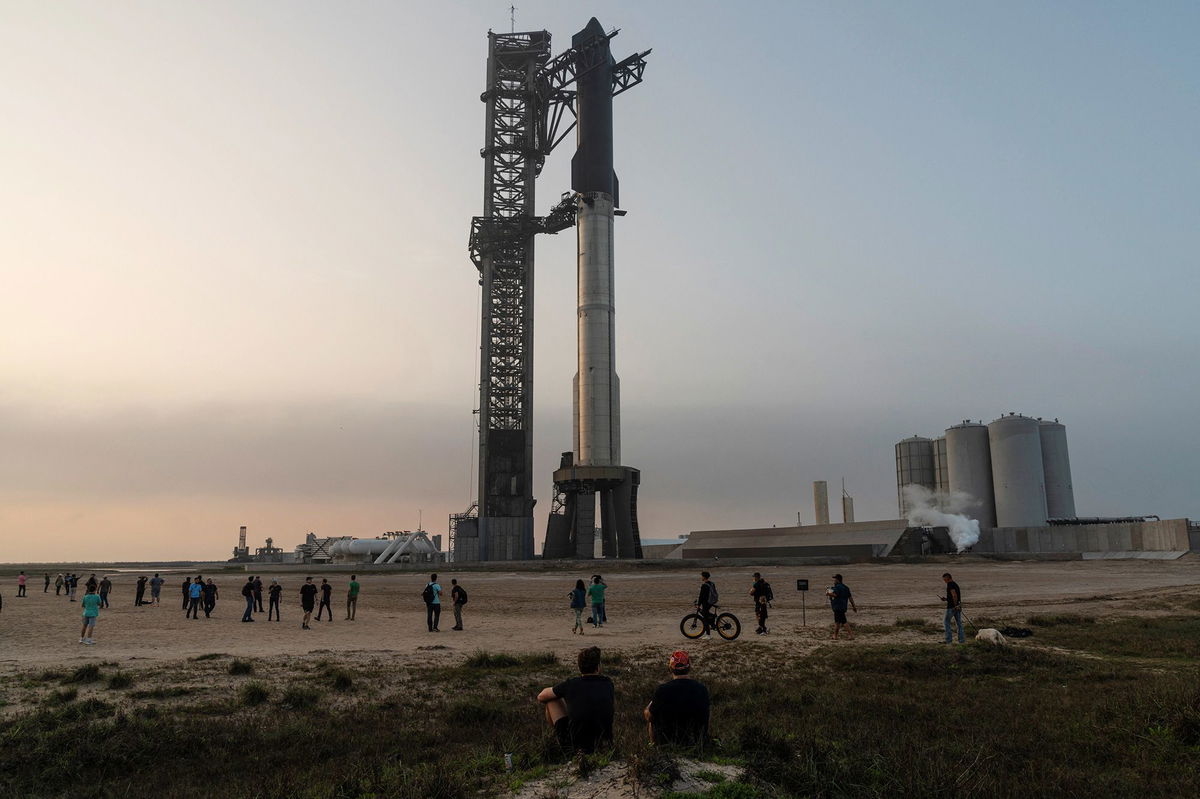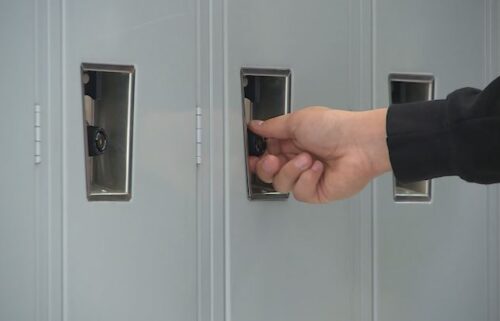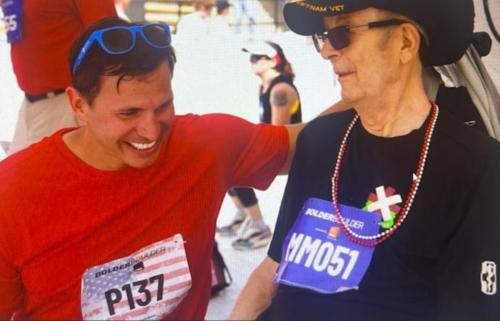SpaceX gets approval for Starship launch amid standoff with FAA

FAA Administrator Mike Whitaker testifies before the House Committee on Transportation and Infrastructure Subcommittee on Aviation hearing on September 24.
By Jackie Wattles, CNN
(CNN) — Federal regulators granted SpaceX its long-awaited license to move forward with a fifth uncrewed test launch of Starship, the most powerful rocket system ever constructed.
The US Federal Aviation Administration, which licenses commercial rocket launches, announced Saturday that SpaceX had “met all safety, environmental and other licensing requirements for the suborbital test flight.”
The Super Heavy rocket booster, topped with the Starship spacecraft, is set to lift off from the company’s Starbase facility in Boca Chica, Texas, during a 30-minute launch window that starts at 8 a.m. ET Sunday, according to the SpaceX website.
The demonstration mission is on track to include an ambitious attempt to maneuver Starship’s 232-foot-tall (71-meter) rocket booster back to a gargantuan landing structure after it burns through most of its fuel and breaks away from the upper Starship spacecraft. If successful, the Super Heavy will be caught midair with a pair of massive metal pincers that SpaceX refers to as the “chopsticks.”
Meanwhile, the Starship spacecraft will continue flying on its own, using its six onboard engines, before practicing a landing maneuver over the Indian Ocean about one hour after launch.
The goal for each milestone is to hash out how SpaceX might one day recover and rapidly refly Super Heavy boosters and Starship spacecraft for future missions. Quickly reusing rocket parts is considered essential to SpaceX’s goal of drastically reducing the time and cost of getting cargo — or ships of people — to Earth’s orbit and deep space.
Ultimately, SpaceX plans to use the Starship capsule as the landing vehicle that will ferry NASA astronauts to the lunar surface as soon as 2026 as part of the Artemis III mission — and eventually put the first humans on Mars.
SpaceX’s feud with FAA
The FAA’s approval for this mission comes as SpaceX — and in particular its combative CEO Elon Musk — and the federal agency have been publicly sparring.
The FAA had been expected to hand down a license for this test launch weeks ago. SpaceX has said that the Starship vehicle has been ready to launch “since the first week of August.”
But the agency delayed the license because SpaceX had filed the application without “disclosing that they were in violation of Texas and federal law on some matters,” said FAA Administrator Mike Whitaker during a September 24 appearance before Congress.
Whitaker said a 30-day delay was triggered when SpaceX failed to give the FAA an updated “sonic boom report.” Sonic booms are the loud noises that a rocket can emit as it begins traveling faster than the speed of sound.
Another delay was caused by SpaceX’s “failure to comply with Texas law,” Whitaker said, apparently referring to accusations that SpaceX did not have proper permits for operating a water deluge system in Texas that is used to tamper the blow from the Super Heavy rocket booster as it lifts off.
In a publicly shared letter, SpaceX denied Whitaker’s contention that the delays were related to public safety.
“Additionally, his assertion that SpaceX violated state law is simply wrong. SpaceX did not violate state law — SpaceX had a permit for deluge operations from Texas Commission on Environmental Quality (TCEQ),” the company said in a September 24 statement. (The commission didn’t immediately respond to CNN’s request for comment.)
SpaceX has also publicly denied reports that the company violated wastewater regulations with the deluge system, which SpaceX says uses potable water.
In a September blog post, SpaceX also said that outgoing “water has been sampled after every use of the system and consistently shows negligible traces of any contaminants, and specifically, that all levels have remained below standards for all state permits that would authorize discharge.”
In a statement regarding the water deluge system, the FAA said Friday that it does consider SpaceX in compliance with the Clean Water Act.
That determination came after the FAA received confirmation from Texas regulators and the federal Environmental Protection Agency in August and September, respectively, that SpaceX had agreed “to obtain a Texas Pollutant Discharge Elimination System permit, pay civil penalties, and comply with various monitoring and reporting requirements,” according to a statement from the FAA.
The EPA deferred questions to the Texas Commission on Environmental Quality, which did not respond to CNN’s requests for comment.
SpaceX is also facing a lawsuit from environmentalists over the issue, which the company has called “unwarranted and frivolous.”
Waiting to fly
SpaceX had indicated as recently as late September that it expected to receive approval for the latest Starship test flight in November. That time frame was unexpectedly moved up in early October.
It’s unclear what prompted the change.
Musk has repeatedly used X, the social media platform formerly known as Twitter that he purchased two years ago for $44 billion, to blast the FAA.
In a September 17 post, he threatened to sue the agency for “regulatory overreach.” Musk — who has taken an increasingly vocal stance on politics, voicing distaste for the Biden administration and his support for former President Donald Trump — also posted on September 25 that he believes Whitaker “should resign.” Musk has also alleged the agency’s activities have been “politically motivated.”
Musk’s declarations came after the FAA proposed $633,009 in civil penalties against SpaceX over violating launch license requirements twice during flights of its workhorse Falcon 9 rocket.
SpaceX has denied wrongdoing related to those requirements, saying none of the allegations related to public safety. In a September 18 letter, the company said that it also gave FAA advance notice of changes to its launch operations and the agency failed to act in a timely manner.
During his appearance before the US House Committee on Transportation and Infrastructure in September, Whitaker said he supported SpaceX’s goals but hoped to hold the company accountable.
“I agree that this is a vital mission,” Whitaker told Rep. Kevin Kiley, a Republican from California, about SpaceX’s Starship development. “I think SpaceX has been a very innovative company — but I think they’re also a mature company. … And I think they need to operate at the highest level of safety.”
SpaceX has previously run afoul of the FAA in Starship testing. Notably, the company launched a 2020 test flight of a prototype rocket, called Starship SN8, without obtaining prior approval from the FAA for a public safety waiver. At the time, the FAA said it had denied the waiver, though it did not plan to take further enforcement actions against SpaceX.
Musk’s tone about the FAA has routinely shifted. At one point in 2023, for example, he said that he did not blame the FAA for holding up Starship launches.
“In fairness to the FAA, it is rare for them to cause significant delays in launch,” Musk said at the time. “Overwhelmingly, the responsibility is ours.”
The-CNN-Wire
™ & © 2024 Cable News Network, Inc., a Warner Bros. Discovery Company. All rights reserved.



